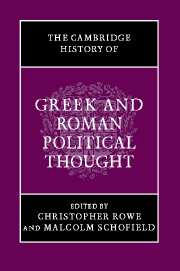Book contents
- Frontmatter
- Introduction
- PART I ARCHAIC AND CLASSICAL GREECE
- 1 Greek political thought: the historical context
- THE BEGINNINGS
- ARISTOTLE
- 15 Aristotle: an introduction
- 16 Naturalism
- 17 Justice and the polis
- 18 Aristotelian constitutions
- 19 The Peripatos after Aristotle
- PART II THE HELLENISTIC AND ROMAN WORLDS
- Epilogue
- Bibliographies
- Index
- Map 1. Greece in the fifth century bc"
- References
19 - The Peripatos after Aristotle
from ARISTOTLE
Published online by Cambridge University Press: 28 March 2008
- Frontmatter
- Introduction
- PART I ARCHAIC AND CLASSICAL GREECE
- 1 Greek political thought: the historical context
- THE BEGINNINGS
- ARISTOTLE
- 15 Aristotle: an introduction
- 16 Naturalism
- 17 Justice and the polis
- 18 Aristotelian constitutions
- 19 The Peripatos after Aristotle
- PART II THE HELLENISTIC AND ROMAN WORLDS
- Epilogue
- Bibliographies
- Index
- Map 1. Greece in the fifth century bc"
- References
Summary
The fate of Aristotle’s writings
Aristotle evidently intended only some of his works for wider circulation, or ‘publication’; these were the so-called ‘exoteric’ works, mainly dialogues, which are now lost apart from some fragments. The genuinely Aristotelian parts of our corpus Aristotelicum represent an assemblage of collections of notes on particular topics, or more finished treatises, which evidently would only have been available for consultation by individuals, especially (we might suppose) members of his school; if in principle they might have been more widely available, it is hard to imagine a large demand for such a large body of relatively intractable material. It is thus possible to argue that other schools might not have had the direct access to Aristotle’s work that, living in a different age, we might incautiously presume; nor indeed are the fragmentary remains of the later Peripatetics sufficient to prove that in later periods of the school, after Theophrastus, even they had a complete collection in Athens. The first systematic edition was evidently that of Andronicus of Rhodes, at Rome, in the first century bc. Aristotle left his library, which also included a large collection of other books, to Theophrastus, and Theophrastus left it to another Peripatetic, Neleus; and reports in Strabo (XIII. 1, 54, 608–9) and in Plutarch (Life of Sulla 26) suggest that at some point between then and Andronicus’ editorial activity at least a proportion of the corpus was sufficiently ‘lost’, or inaccessible, to need to be ‘rediscovered’ – or to be capable of being described in such terms – when Sulla brought Aristotelian manuscripts back with him to Rome from Asia Minor.
- Type
- Chapter
- Information
- The Cambridge History of Greek and Roman Political Thought , pp. 390 - 395Publisher: Cambridge University PressPrint publication year: 2000
References
- 2
- Cited by

